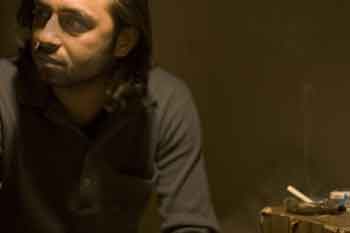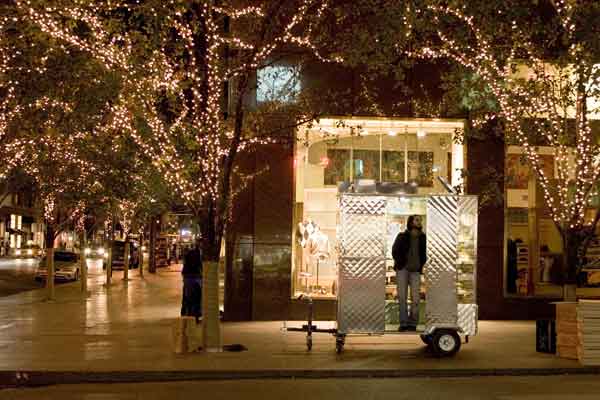MAN
PUSH CART
|
Roger Ebert wrote about "Man
Push Cart" from Sundance:
PARK
CITY, Utah On the last day of Sundance 2006, I went to see one final film,
named Man Push Cart. It was playing at 8:30 a.m. in the Prospector Square
Theater, which is a large room filled with fairly comfortable folding chairs.
The movie tells the story of a young man who was once a rock star in his
native Pakistan, but now operates a stainless steel push cart on the streets
of Manhattan, vending coffee, tea, muffins and bagels (You want ream cheese?).
The
room was filled. In front of me were a woman from Ogden and her brother
from Philadelphia. They said they attend Sundance to see films that are
really about something. After Man Push Cart was over, they said
they loved it. So did I. But I loved it not only for itself, but because
of the conditions of its making.
At the end of 10 days and hundreds of films and hype about movie stars and
swag bags and midnight parties, this is what Sundance is really about: This
man pushing this cart.
|
The
movie was written and directed by Ramin Bahrani, an American
born in Iran. It stars Ahmad Razvi, an American born in Pakistan.
It was shot in less than three weeks, on a small budget, with
Bahrani grabbing a lot of his shots by filming from across the street.
There’s
a scene where the hero, also named Ahmad, offers to sell some bootleg videos
to a couple of guys loading merchandise. He says they’re $8 each,
two for $15. I can get them for four bucks in Brooklyn, says one of the
guys. This guy did not know he was in a film; Bahrani got him to sign a
release so he could keep the scene. As for (the real) Ahmad, when he was
not acting he was working on locations and continuity. Everybody on the
film worked on everything.
|
 |
Ahmad
(the character) is a sad man whose wife has died and whose
in-laws will not let him see his son. His career as a singing
star is long forgotten. He gets up at three every morning, stocks
his cart, and pulls it through the streets. He makes friends with
a Spanish woman who is filling in for a relative at a nearby magazine
stand. She likes him. But can he see a future for himself?
Bahrani said
one of the inspirations for his film was The Myth of Sisyphus, by
Albert Camus. That’s the story of a man who spends his life rolling
a heavy rock up a hill, only to see it roll back down again. The life of
Ahmad resembles the plight of Sisyphus. At the end of the film, we see him helping
a friend pull a cart through the streets. Two Men Push Cart, I guess. Is
this progress? Is it reason for hope?
It's almost
impossible to convey the particular tone and effect of Man Push Cart. It
is an experience, not a synopsis. My purpose is to show that with very
little money but a lot of effort, a director can push a movie all the way
uphill to Sundance. The director man may have been born in Iran and his
star may be from Pakistan, but they are Americans, their film is mostly
in English, it is entered in the American Spectrum section, and people from
Ogden and Philadelphia come to see it because they hunger for such films. The
whole experience contains the Sundance idea: Anyone can make a movie, and
if it is good enough Sundance can help it find an audience.
|
 |
|
|
|













